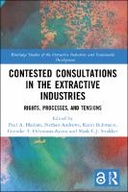Explore

Contested Consultations in the Extractive Industries
0 Ungluers have
Faved this Work
Login to Fave
This volume examines how communities, companies, and governments contest and contribute to the evolution of norms, rules and decision-making procedures that govern stakeholder consultation in the extractive industries. In recent years international organisations, governments and companies around the world have dramatically reformed the regime that governs consultations with community stakeholders about proposed extractive projects. However, the characteristics of this consultation regime are often contested, with diverse stakeholders seeking to defend their interests by drawing on different authoritative interpretations of the rules, norms and decision-making procedures that govern stakeholder consultation. Contestation over the meaning, governance and practice of stakeholder consultation is the central thread that ties this book together. Within this overarching concern, the volume takes a global and comparative perspective that examines the complexity of these intersecting and overlapping consultation requirements, with a particular focus on Indigenous Peoples, using cases from the Global North and Global South, including Argentina, Australia, Brazil, Canada, The Central African Republic, The Democratic Republic of Congo, Iceland, Ghana, Greenland, Guyana, Norway, and Peru. The book highlights the tensions associated with the application of this contested regime and identifies possible solutions from best practices around the world. From a theoretical perspective the book unpacks the maze of overlapping consultation requirements and practices that highlights the normative disagreements between key stakeholders and the overlapping rules and procedures that govern the implementation of consultation. A unique contribution of this collection is the commentary from practitioners, who reflect on the same issues addressed by the academic contributors, but based on their own vast practical experience. This book will be of great interest to students and scholars researching public participation and stakeholder consultation in the extractive industries as well as natural resource governance and sustainable development more broadly. The Open Access version of this book, available at http://www.taylorfrancis.com, has been made available under a Creative Commons Attribution-Non Commercial-No Derivatives (CC BY-NC-ND) 4.0 license.
This book is included in DOAB.
Why read this book? Have your say.
You must be logged in to comment.
Rights Information
Are you the author or publisher of this work? If so, you can claim it as yours by registering as an Unglue.it rights holder.Downloads
This work has been downloaded 13 times via unglue.it ebook links.
- 13 - pdf (CC BY-NC-ND) at OAPEN Library.
Keywords
- Bottom-up Governance
- Corporate social responsibility
- environmental impact assessment
- extractive industries
- Human rights
- Indigenous peoples
- Mining
- natural resource management
- public participation
- resource development
- resource extraction
- stakeholder consultation
- sustainable mining
- thema EDItEUR::G Reference, Information and Interdisciplinary subjects::GT Interdisciplinary studies::GTP Development studies
- thema EDItEUR::J Society and Social Sciences::JP Politics and government
- thema EDItEUR::K Economics, Finance, Business and Management::KJ Business and Management::KJJ Business and the environment
- thema EDItEUR::K Economics, Finance, Business and Management::KJ Business and Management::KJS Sales and marketing
- thema EDItEUR::K Economics, Finance, Business and Management::KN Industry and industrial studies::KNA Agribusiness and primary industries
- thema EDItEUR::L Law::LB International law::LBB Public international law::LBBR Public international law: human rights
- ‘green’ approaches to business
Links
DOI: 10.4324/9781003488507Editions

